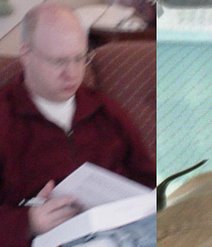“…it is imperative that the leadership of the church take up the
Ephesians 4 mandate to equip the saints. As I was shown prophetically a few
years ago, the Lord's patience with the shepherds and ministries who are not
doing this is running out, and they will be removed from their places. However,
New Testament ministry does not just do the work of the ministry, but equips
others to do it as well, just as the Lord Himself gave us an example.”
-Rick Joyner’s Word for the Week, 6/11/07
Rick Joyner is one of the leaders of the charismatic-prophetic movement. He often writes about “the church,” and when he does, I wonder what he means by it. The week before he wrote, “[W]ith true spiritual maturity there will be increasing humility, not arrogance… [which] will always be found to have increasing fellowship and interchange with the rest of the body of Christ. That is also a sure sign of true spiritual maturity—we start to discern the whole body, not just our little part.” By the whole body, I assume he means more than just prophetic churches, or even charismatic churches. I tend to think he has evangelical churches in mind, though I have never seen him say asmuch.
What is “the whole body?” Is it the evangelical movement? Is it the Protestant church? Are Roman Catholics in? How about Orthodox churches? How about Mormons or Jehovah’s Witnesses? Robert Jenson, in the preface to his Systematic Theology, writes, “[T]he only church conceivably in question is the unique and unitary church of the creeds.” I think he is right on target. Does a church adhere to the Apostles’, Nicene, and Chalcedonian creeds? Then they are part of the catholic church – catholic with a small ‘c,’ meaning universal, which is much larger than the body we think of as Roman Catholic. Despite all that we might find wrong in them we must still think of them as part of ‘us’ rather than choosing a different (and arbitrary) standard that would allow us to exclude them. The catholic church includes most Protestant churches, the Roman Catholics, and Orthodox churches, but excludes Mormons and Jehovah’s Witnesses.
But Jenson goes on to observe, “To live as the church in the situation of a divided church – if this can happen at all – must at least mean that we confess we live in a radical self-contradiction and that by every churchly act we contradict that contradiction.” It seems to me that he conceives of this division either in theological or hierarchical terms. Either way, it is exactly here that I take issue. The church’s unity is primarily spiritual, a result of being indwelt by the Holy Spirit. The unity of the church ought not to be the unity of a Christmas tree farm where order is produced through artificial rows. The unity of the church is more like a forest, which consists of a complex ordering and interconnectedness, but not the kind we might choose to impose on it. The mandate of the church is to rule over the earth and subdue it, not to be forced into a giant edifice reaching to the heavens. But we do the church a great disservice if we attempt to enforce cookie-cutter-like conformity. And it seems that an organizationally diverse church is less likely to be infiltrated and subverted from her mandate to be a prophetic voice of justice in the world.
If we reject any portion of the true church, we act as 'mere men' (1 Cor 3.3). The temptation to splinter off and form faction must always be resisted. So how much fellowship and interchange can we have with the rest of the church, especially when we have significant differences? How willing are we to follow Joyner’s admonition with respect to Roman Catholic or Orthodox churches? Are we prepared to change our thinking of who “us” is if we have defined it differently? Paul did not crease giving thanks for the whole church, frequently making mention of it in his prayers (Eph 1.16). Will we do the same?


1 comment:
P.S.
Alastair has many similar thoughts at http://alastair.adversaria.co.uk/?p=688
Post a Comment